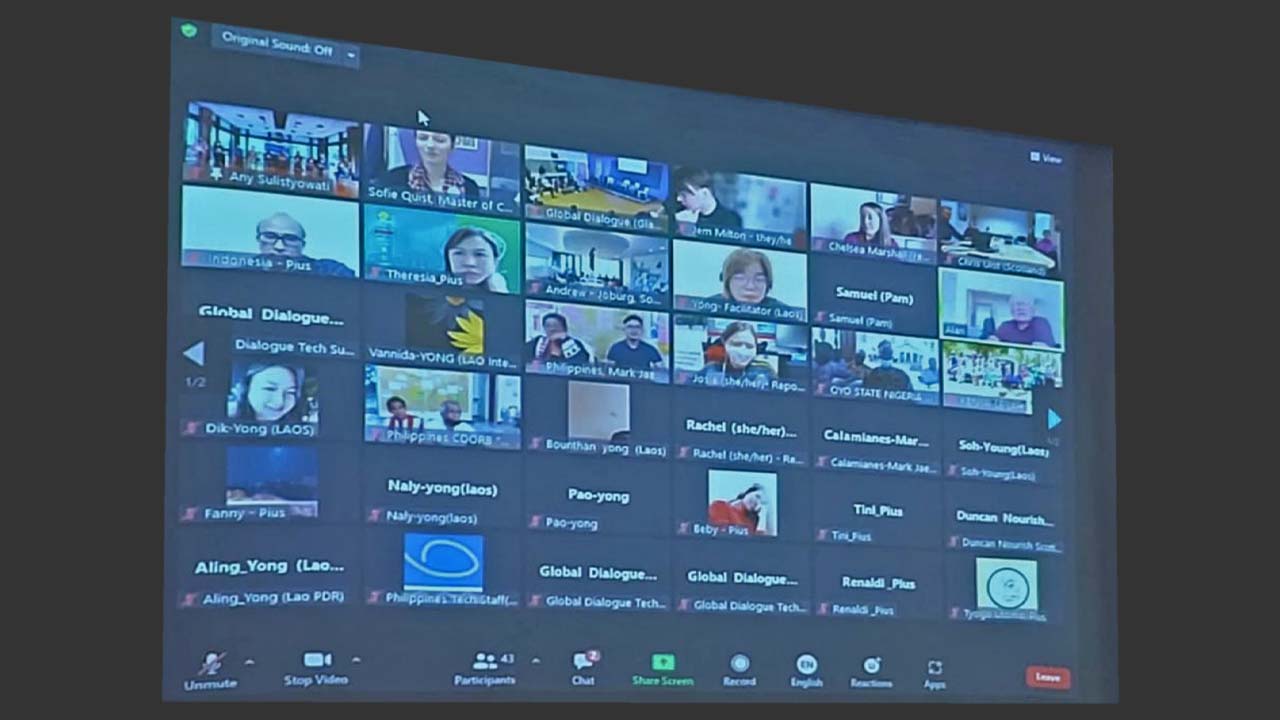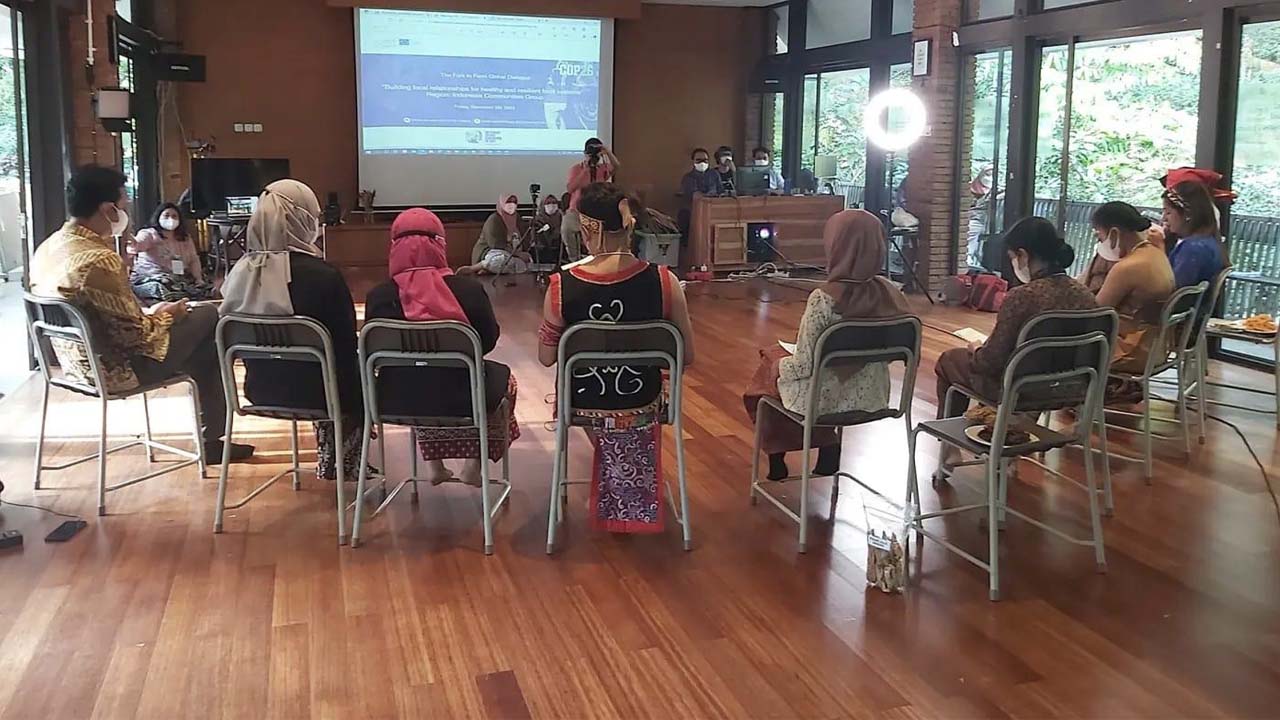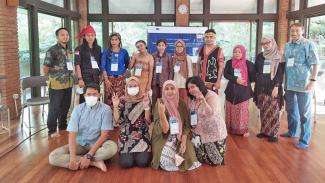On 5 November 2021, the Samdhana Institute organized The Fork to Farm Global Dialogue for Southeast Asia, as part of COP26 in Glasgow. Co-organised by Nourish Scotland and featuring representatives of communities from various countries worldwide, the event implemented a hybrid format (i.e., with a mix of offline participants in Glasgow and others attending online in their respective countries, in Asia, Africa, Europe, and America)
The Indonesian team, facilitated by Samdhana, joined the online dialogue via Zoom from the Eco-Learning Camp in Bandung, West Java. This team was comprised of a facilitator, a government representative, six community representatives and a researcher/academic representative. Activities were divided into a first dialogue session, then an internal reflection period for each team, followed by a second dialogue session.
During the first session, the Indonesian team facilitated by Any Sulistyowati from KAIL, shared their experiences with the South African group, covering a wide range of sectors, issues and areas of expertise. First of all, as a representative from the Government of Indonesia, Destry Anna Sari opened the dialogue, sharing information related to programmes carried out by the Ministry of Cooperatives and SMEs to support local food systems. She then opened the floor to a number of community representatives, each of whom related their unique perspectives in relation to food systems and security.
The first speaker was Adriana Ance, from the Papha Community of Maumere in Sikka Regency, East Nusa Tenggara. She described how cassava can be processed into various forms of local food in her community, while also noting the various challenges faced by the community. She expressed her hopes that modern ways of processing food could be employed, in order to save time and yield better results.
The second Indonesian speaker was Nunung, from the Ath-Thaariq Islamic Boarding School in Garut, West Java. She described the various kinds of processed banana products originating in her region, in addition to the efforts being made to open up economic opportunities for the younger generation. Next up was Naomi Waisimon, from the Tabi Community of Jayapura Regency in Papua. She expressed her deep concerns about the continued availability of sago for the people of Papua.
After that, Mustaqim (Utha) spoke on behalf of the Patalassang Community of Gowa Regency, South Sulawesi. He described how Indigenous elders in the community were encouraged to pass on traditional knowledge to the younger generation. Next, Restiawati from the Blind Coffee Community of Bogor, West Java, conveyed her experiences as a representative of the disabled community, especially those taking an interest in environmental issues.
The final presenter was Jhonatan Yuditya Pratama (Jojo), from the Dayak Indigenous Community of Landak Regency, West Kalimantan. He tackled the issue of ‘climate injustice’ – the disparity in how the causes and impacts of climate change were experienced disproportionately by various community groups. To wrap up, Angga Dwiartama, from the Bandung Institute of Technology, reminded all in attendance that local food systems were not only a spatial and economic ecological issue, but also a social, cultural and political issue. All these dimensions must therefore be considered in the development of local food.

During the first dialogues, the Indonesian group was paired with group from South Africa. Issues discussed included food waste, climate change and other threats to agricultural ecosystems. Speakers shared information and solutions related to food resilience and distribution, employment opportunities, stakeholder collaboration and capacity building.
One South African representative told the Indonesian team about a local market network created to facilitate better food distribution. There were also stories from other presenters about farms collaborating with each other to address the challenges posed by Covid-19; sustainable urban farming initiatives, designed to improve planting choices in support of nature preservation and food security in South Africa.
On the second dialogues, the Kenyan team focused on various issues of interest to the Indonesian group, including initiatives designed to lessen the burden on working women. Samuel, the first presenter, told the Indonesian team about initiatives carried out by farmers in his community, namely the conservation of springs, planting trees, applying biogas to produce fertiliser and energy for farmers, and reducing the workload of women who collect firewood.
A speaker by the name of Lucy explained how Kenyan women have a very heavy workload, working from morning until night. They are responsible for ensuring adequate nutrition for the family, while also feeding the livestock, taking care of the house, tending the garden, looking for firewood and taking care of various other domestic chores. Another Kenyan woman, named Joan, described the inequality that exists between small-scale farmers and the wealthier landowners in her country.
Time constraints and language barriers made the dialogue process between the two parties less than ideal. During the interactions, each group only had half an hour to speak. This time had to be divided among all presenters and contributors, which gave them very little time to express their views in a comprehensive way. Further time was required for the process of translation.
Despite these challenges, participants from Indonesia felt satisfied and proud to have been involved in this activity. They learned some valuable lessons from information shared by dialogue partners and also from the engagement process in general. Hopefully, the positive initiatives that have been carried out can be continued and serve the interests and aspirations of all parties involved.





